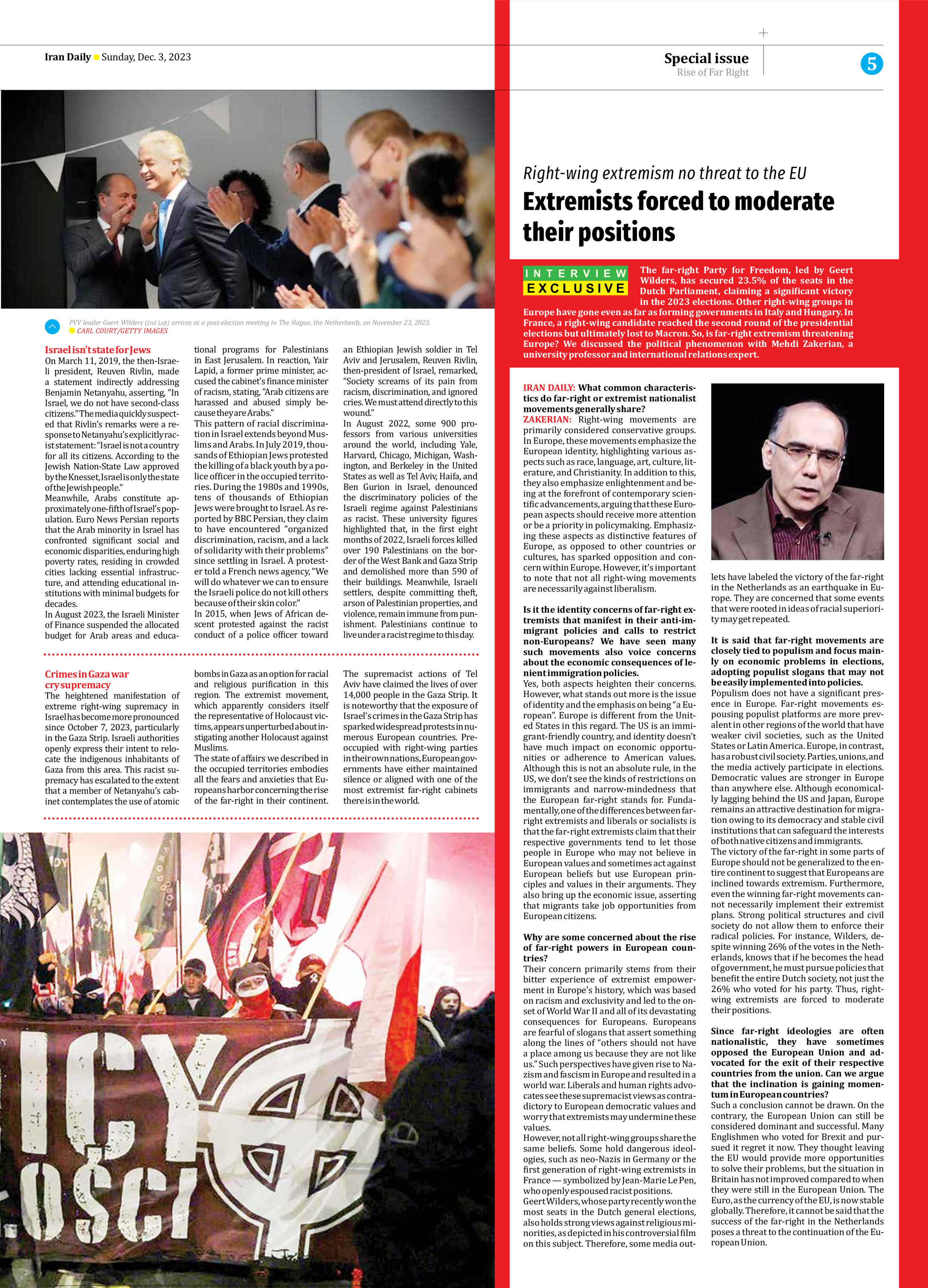
We are superior, so we kill
Israel worst case of right-wing extremism
By Ebrahim Beheshti
Staff writer
The successes of far-right extremists in elections in various European countries have sparked concerns among governments and the public across the continent. In a report, BBC Persian described the victory of the far-right Party for Freedom in the Netherlands, led by Geert Wilders, as a seismic event in Europe.
Previously, the far-right successfully formed a government in Italy. In France, the far-right strengthened its social base, with their candidate reaching the second round in the presidential elections, although facing defeat against Emmanuel Macron. Far-right or extremist nationalists in several other European countries have also achieved success. However, a significant portion of Europe, especially its public opinion, is worried about the rise of the far-right.
According to Abolqasem Delfi, former Iranian ambassador to France, Belgium, and Serbia, and Mehdi Zakerian, an international relations expert, Europeans are concerned about the supremacist and racist views of the far-right, which historically contributed to World War II, the deadliest war in history. Statistics indicate that nearly 80 million people lost their lives during that war or later due to its consequences.
Far-right extremists advocate for harsh policies, particularly the expulsion of immigrants or the imposition of stricter restrictions against them. Far-right thinking is founded on emphasizing or considering one’s race, language, culture, and national identity as superior. These thoughts are so narrow-minded that some far-right individuals in Europe went as far as demanding an exit from the European Union, rejecting the collective nature of the entity called Europe.
The Holocaust was the most heinous record of supremacist actions. Incidentally, the regime that claims it is securing the interests of Jews worldwide has turned into a clear manifestation of supremacist ideology. In fact, European concerns about the dangers of far-right extremists have reached greater heights in the case of Palestine. Presently, the Israeli regime’s cabinet serves as a gathering place for far-right extremists led by Benjamin Netanyahu, and, according to some of its officials, is racism incarnate.
Israel isn’t state for Jews
On March 11, 2019, the then-Israeli president, Reuven Rivlin, made a statement indirectly addressing Benjamin Netanyahu, asserting, “In Israel, we do not have second-class citizens.” The media quickly suspected that Rivlin’s remarks were a response to Netanyahu’s explicitly racist statement: “Israel is not a country for all its citizens. According to the Jewish Nation-State Law approved by the Knesset, Israel is only the state of the Jewish people.”
Meanwhile, Arabs constitute approximately one-fifth of Israel’s population. Euro News Persian reports that the Arab minority in Israel has confronted significant social and economic disparities, enduring high poverty rates, residing in crowded cities lacking essential infrastructure, and attending educational institutions with minimal budgets for decades.
In August 2023, the Israeli Minister of Finance suspended the allocated budget for Arab areas and educational programs for Palestinians in East Jerusalem. In reaction, Yair Lapid, a former prime minister, accused the cabinet’s finance minister of racism, stating, “Arab citizens are harassed and abused simply because they are Arabs.”
This pattern of racial discrimination in Israel extends beyond Muslims and Arabs. In July 2019, thousands of Ethiopian Jews protested the killing of a black youth by a police officer in the occupied territories. During the 1980s and 1990s, tens of thousands of Ethiopian Jews were brought to Israel. As reported by BBC Persian, they claim to have encountered “organized discrimination, racism, and a lack of solidarity with their problems” since settling in Israel. A protester told a French news agency, “We will do whatever we can to ensure the Israeli police do not kill others because of their skin color.”
In 2015, when Jews of African descent protested against the racist conduct of a police officer toward an Ethiopian Jewish soldier in Tel Aviv and Jerusalem, Reuven Rivlin, then-president of Israel, remarked, “Society screams of its pain from racism, discrimination, and ignored cries. We must attend directly to this wound.”
In August 2022, some 900 professors from various universities around the world, including Yale, Harvard, Chicago, Michigan, Washington, and Berkeley in the United States as well as Tel Aviv, Haifa, and Ben Gurion in Israel, denounced the discriminatory policies of the Israeli regime against Palestinians as racist. These university figures highlighted that, in the first eight months of 2022, Israeli forces killed over 190 Palestinians on the border of the West Bank and Gaza Strip and demolished more than 590 of their buildings. Meanwhile, Israeli settlers, despite committing theft, arson of Palestinian properties, and violence, remain immune from punishment. Palestinians continue to live under a racist regime to this day.
Crimes in Gaza war
cry supremacy
The heightened manifestation of extreme right-wing supremacy in Israel has become more pronounced since October 7, 2023, particularly in the Gaza Strip. Israeli authorities openly express their intent to relocate the indigenous inhabitants of Gaza from this area. This racist supremacy has escalated to the extent that a member of Netanyahu’s cabinet contemplates the use of atomic bombs in Gaza as an option for racial and religious purification in this region. The extremist movement, which apparently considers itself the representative of Holocaust victims, appears unperturbed about instigating another Holocaust against Muslims.
The state of affairs we described in the occupied territories embodies all the fears and anxieties that Europeans harbor concerning the rise of the far-right in their continent. The supremacist actions of Tel Aviv have claimed the lives of over 14,000 people in the Gaza Strip. It is noteworthy that the exposure of Israel’s crimes in the Gaza Strip has sparked widespread protests in numerous European countries. Preoccupied with right-wing parties in their own nations, European governments have either maintained silence or aligned with one of the most extremist far-right cabinets there is in the world.







